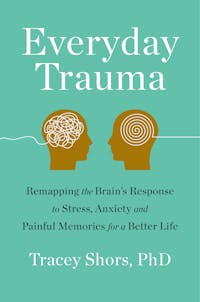Everyday Trauma
Remapping the Brain's Response to Stress, Anxiety, and Painful Memories for a Better Life
 Download image
Download image
ISBN10: 1250247012
ISBN13: 9781250247018
Trade Paperback
208 Pages
$18.99
CA$24.99
Everyone experiences trauma. Whether a specific harrowing event or a series of stressful moments that culminate over time, trauma can echo and etch itself into our brain as we remember it again and again throughout our lives.
In Everyday Trauma, neuroscientist Dr. Tracey Shors examines trauma with a focus on its pervasive nature—how it can happen at any time, through big or small events, and how it often reappears in the form of encoded memory. Her research reveals that when we are reminded of our trauma, reliving that tragic moment copies yet another memory of it in our brain, making it that much more difficult to forget. Dr. Shors also explores the neuroscience behind why women in particular are more vulnerable to stress and traumatic events, setting them up to be three times more likely than men to suffer PTSD.
With potential long-term consequences such as addiction, anxiety, depression, and PTSD, trauma can have a lasting impact on both the brain and body. Dr. Shors illuminates the effective tools that can reduce the repetitive thoughts that reinforce our traumas, including cognitive-based therapies and trauma-informed care such as her own groundbreaking program, a combination of mental and physical training called MAP Training.
By understanding how our brain responds to trauma and practicing proven techniques that can train our brains and help us let go of our tragic memories—whatever they may be—we are better equipped to leave our traumatic pasts behind and live in a brighter present.
Reviews
Praise for Everyday Trauma
“In Everyday Trauma, Dr. Shors maps a path for recovery based on her deep knowledge of neuroscience and courageous compassion. This meditative ‘fit for life’ path of brain repair and restoration can enrich every moment, anywhere, anytime.”—Roberta Diaz Brinton, Regents professor of pharmacology and neurology, University of Arizona
"An accessible, exciting and valuable description of a complex and important issue in mental health: the effects of trauma/stress on depression and anxiety—particularly in women—as mediated by ruminative thought patterns. It draws from many diverse areas of research and presents a beautifully developed analysis suggesting the value of specific mental and physical (MAP) activities to increase resilience to trauma: Fascinating from a research perspective; potentially important in all of our lives!"—Caroline Blanchard, Emeritus Professor, University of Hawaii
“Everyday Trauma is an engaging book that informs the reader about the brain and bodily processes underlying emotional trauma, as well as effective treatments for the consequences of trauma. Tracey Shors, a highly recognized neuroscientist, presents the scientific evidence clearly and crisply and buttresses the findings with fascinating personal stories. Anyone interested in understanding emotional trauma should have this book.”—James L. McGaugh, author of Memory and Emotions
"Shors’s research is impressive, and she effectively explains the complicated relationship between trauma and memory . . . a fine introduction to the workings of trauma."—Publishers Weekly
Reviews from Goodreads
BOOK EXCERPTS
Read an Excerpt
1
Life’s Traumas—Both Large and Small
My life has been filled with trauma. When there are a lot of traumas in your life, you kind of take them for granted. As far as I’m concerned, traumas are everyday occurrences. A looped...



